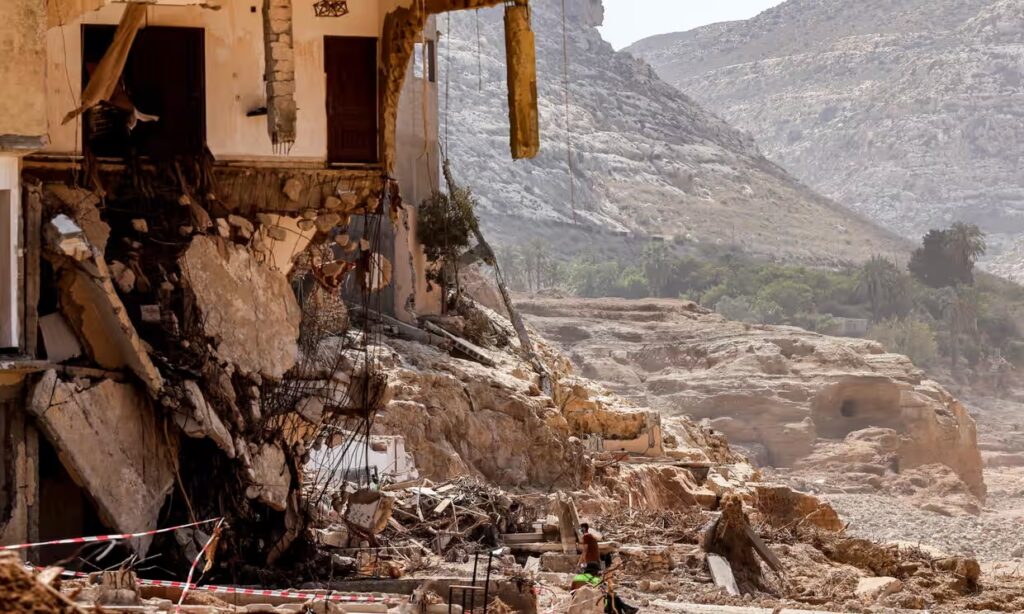Carbon pollution led to heavier rains and stronger floods in Greece and Libya this month but other human factors were responsible for “turning the extreme weather into a humanitarian disaster”, scientists have said.
Global heating made the levels of rainfall that devastated the Mediterranean in early September up to 50 times more likely in Libya and up to 10 times more likely in Greece, according to a study from World Weather Attribution that used established methods but had not yet been peer-reviewed.
The network of scientists, who race to understand extreme weather events as soon as they happen, found people were made more vulnerable to the rain because of factors such as building homes on floodplains, chopping down trees and not maintaining dams.
“The Mediterranean is a hotspot of climate-change-fuelled hazards,” said Friederike Otto, a climate scientist at Imperial College London and co-author of the report.
While researchers found it harder to quantify the role of climate change in this study than they did for recent wildfires and heatwaves, she added, “there is absolutely no doubt that reducing vulnerability and increasing resilience to all types of extreme weather is paramount for saving lives in the future”.
Storm Daniel struck several Mediterranean countries in the first two weeks of September and dropped torrential rains. The floods killed dozens of people in Europe and Turkey. In Libya, where two ageing dams burst near the city of Derna and washed away entire neighbourhoods, the confirmed death toll stretches into the thousands.
The amount of rain that fell in Libya was “far outside that of previously recorded events”, the WWA report found. Up to 50% more rain fell than it would have in a world where people had not changed the climate, the report found, though the researchers cautioned that the level of uncertainty was high.
The report found the ongoing conflict and political instability in Libya compounded the effects of the flooding. Dams built in the 1970s had been poorly maintained. They may also have been designed based on short rainfall records that underestimated how strong an extreme storm could be.
The report found that people were at greater risk because the dams stored so much water and failed at night, leaving little time to escape.
“We urgently need to reduce exposure to flood risks,” said Maja Vahlberg from the Red Cross Red Crescent climate centre, a co-author of the report.
In Greece, Bulgaria and Turkey, the rains were up to 40% heavier because of global heating, the scientists found. Across the region, such extreme rain could now be expected once a decade. In central Greece, where most of the damage took place, such an event could now be expected every 80-100 years.
Vassiliki Kotroni, a research director at the National Observatory of Athens and co-author of the report, described the floods as a “breaking point”. He called for early warning systems and “the design of resilient infrastructures in the era of climate change”.
Changes to the landscape made the Greek floods more damaging, the report found. As a result of urbanisation and deforestation, more people and houses were hit by floods, and there was less nature to soak up the stormwater.
Enrique Doblas, an ecologist and member of Mediterranean Experts on Climate Change and Environment, who was not involved in the study, said: “This reinforces our understanding that while climate change can be seen as the underlying cause of recent catastrophes, its impacts are exacerbated by landscape management that lacks adequate preventive measures.”
The WWA researchers cautioned that they “cannot completely rule out the possibility that climate change has not affected the likelihood and intensity of events like these”. Two main limitations in their statistical analysis were the lack of long-term data from local weather stations and the ability of climate models to represent rare extremes over small areas.
Despite this, they said, they were confident in their conclusion that global heating had played a role.
People have heated the planet 1.2C since the Industrial Revolution by burning fossil fuels and destroying nature, and Europe has warmed nearly twice as fast. Because hotter air can hold more water vapour, a downpour can release more rain. The researchers said they found no evidence of factors that may be making heavy rain less likely.
Julie Arrighi, a director at the Red Cross Red Crescent climate centre, said: “This devastating disaster shows how climate-change-fuelled extreme weather events are combining with human factors to create even bigger impacts, as more people, assets and infrastructure are exposed and vulnerable to flood risks.
“However, there are practical solutions that can help us prevent these disasters from becoming routine such as strengthened emergency management, improved impact-based forecasts and warning systems, and infrastructure that is designed for the future climate.”
Source : The Guardian


